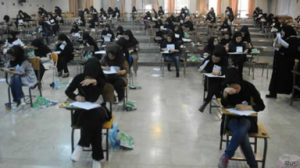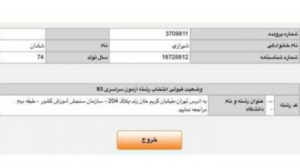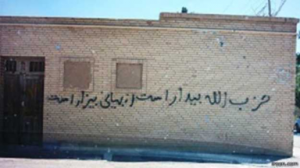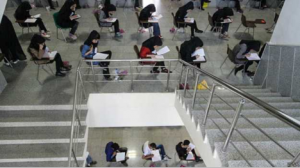by Maryam Ghadirzadeh
Source: www.bbc.co.uk/persian/iran/2014/09/140925_mgh_bahai_students
Translation by Iran Press Watch
25 September 2014
 Baha’is who have taken the nationwide entrance examination in Iran say that their names have been deleted from the list of accepted students.
Baha’is who have taken the nationwide entrance examination in Iran say that their names have been deleted from the list of accepted students.
A group of public university applicants, whose names are believed not to have been announced on the list of those who have been accepted to university, continue to follow-up on the status of their access to higher education.
Shadan Shirazi, Rouhieh Safaju, and Tara Houshmand are amongst the applicants who say that although they gained high rankings in this year’s nationwide entrance examination, they were not accepted in any of their designated fields. Besides the fact that all three of these applicants are women, they also share another similar trait ̶ they are all followers of the Baha’i Faith.
The case of depriving Shadan Shirazi of higher education was the top story in the news media nearly a month ago. It was mentioned that she had gained a ranking of 113 in her nationwide entrance examination score. When the nationwide results were announced, she checked the Iran Examination Institution website, but she was asked to go to the physical location of that institution on the Karim Khan Zand Street in Tehran.

Above is the online message of the Iran Examination Institute to Shadan Shirazi (the message simply states: “Refer to Tehran, Karim Khan Zand Street, number 204, National Institution for Education Examination, Second floor.”)
A number of other Baha’i participants in the nationwide entrance examination have received similar messages upon checking the status of their acceptance, but in most cases traveling to the Karim Khan Zand building has been fruitless.
Shadan Shirazi, on Tuesday September 9th, in a letter written to the Central Delegation of Student Enrollment, wrote that the Examination Institute had implicitly told her that her situation is caused by her religious beliefs.
Various articles of the third section of the Iranian Constitution are dedicated to civil rights; based on these, the people of the country, regardless of tribe, ethnicity, color, race, or language, should enjoy the same rights (1).
Article thirty of the Constitution (2) requires the government to provide free education for all citizens up to the completion of secondary school, and provide the means for free higher education to the extent required by the country for attaining self-sufficiency..

Where did the list of the Baha’is Applicants (1) come from?
How Baha’i participants in this year’s nationwide examination were identified has been the subject of questions. Sarmad Shadabi, one of the participants says: “At no point in the process of registration and participation in the nationwide examination there was a question about the applicant’s religion; moreover, in only one part of the registration form did student have to designate if they were willing to answer several spiritual questions.”
In an interview with the “Page Two” program of BBC Persian, he said that he gained a high ranking in the Nationwide University Examination, and that in his form he selected particular fields and universities to which he had a very high chance of acceptance, but when the results were announced, he was asked to go to the Examination Institute Office. He added: “In our follow-ups, the only answer we received was that we were on a list designated for deletion.”
This candidate for university entrance in Iran stated: “The question is that when we have not mentioned that we are Baha’is and it had not been recorded anywhere, where did this list come from, and why has such a thing happened?”
Diane Ala’i, the Baha’i International Community’s Representative to the United Nations, says that there is no accurate number of Baha’i participants in Iran’s nationwide college examination. In reply to the question of how the Examination Institute of Iran is able to identify the participants who are not allowed to attend university, she said there is a possibility that an Iranian Baha’i database exists.
She reminds us that Asma Jahangir, the former United Nations Special Rapporteur for Freedom of Religion or Belief at the Commission of Human Rights, about ten years ago revealed a confidential memorandum (3) issued by the Chief of Staff of the Armed Forces of the Islamic Republic of Iran, requesting the Intelligence and Security agencies to identify and monitor Baha’is in a “highly confidential” manner.

Ayatollah Ali Khamenei, Supreme Leader of the Islamic Republic of Iran, is the Chief of Staff of Iran’s Armed Forces.
Ms. Ala’i says this memorandum was issued ten years ago, and it is possible to guess that over the years such a list has been compiled.
“Terrorist parents, grandparents and ancestors”
This year a group of Baha’i participants in the Nationwide Examination who are sure that in a fair competition with other participants they would have been accepted to university, have followed up on the reasons for not being accepted, not only with the Examination Institute but also with Members of the Iranian Majles (Parliament).
Ruhiyyeh Safaju, one of the nationwide examination participants, has posted on her Facebook page that this year in September that a group of eight of them had traveled to the Parliament building in Tehran and had met with Alireza Mahjub, one of the Members of Parliament. Ms. Safaj has written that once this MP realized that they were followers of the Baha’i Faith, he yelled at them, insulted their beliefs and exclaimed: “Your parents, grandparents and ancestors were terrorists!”
According to this participant’s post, Mr. Mahjub then told them that upon following up on their situation, he had been told that these individuals have indicated on their forms that they were Baha’is. Ruhiyyeh Safaju, however, writes that there is no place on the examination registration form in which to write “Baha’i”.
University is in Session
Not all Baha’i college entry examination participants face discrimination and elimination at the time of the announcement of the acceptance results. A group of them in some cases, find their names on the list of accepted students; however, in most cases, after registration and the beginning of classes, they experience another form of deprivation.
Farnaz Rouhani is one of these cases. According to reports, after completing her forth semester at Shiraz University, she was barred from continuing her education.
One of the methods that the Baha’i Community of Iran, in order to aid their new generation to continue with higher education, has undertaken, has been the establishment of a special university by the name of “Baha’i Institute for Higher Education” (BIHE). This Institution was established in the mid-1980s. About three years ago it became the subject of a series of aggressive encounters. At that time eleven of the managers and professors of this Higher Education Institution in several cities were detained and sentenced to prison under charges of “Acting against National Security”.
Despite these arrests, Diane Ala’i declares, the activities of BIHE continue. In addition to Baha’is, others who are not Baha’is have a role in running its affairs. She says the activities of BIHE are conducted both online and some face-to-face classes at the houses of Baha’is who wish to participate in this effort.
The website of the Baha’i Institute for Higher Education indicates that currently students can study in 17 fields for undergraduate (Bachelor’s) degrees and 10 graduate (Master’s) degrees.
Participants indicate that there is no space to indicate religion on the registration form.
Legal Case
Studying in a special university, and gaining a degree that can be a prelude to their continued education abroad is the least problematic choice for Baha’is in Iran to continue their education. This year, however, a number of them have pursued a relatively new approach. HARANA news, the news agency of Human Rights Activists in Iran, has reported that a number of these applicants are seeking to launch a legal case in the judicial system of Iran.
Diane Ala’i, the Baha’i International Community’s Representative to the United Nations, states that this undertaking by these Baha’i examination participants is unprecedented. To date most individuals who were faced with this situation, have gone only so far as to follow up on their case with the Examination Institute of Iran.
She says: “In Iran’s judicial system, there are judges who issue unfair judgments, but even if there is a judgment in favor of these students, the Intelligence agencies will once again find a way to divert the path to executing any favorable judgment.”
She reminds us of the case of a group of prominent Iranian Baha’i figures who were subjected to the same fate: although their 20 year prison term was overturned in the courts and was changed to a 10 year term, “the Attorney General again sentenced them to 20 years in prison.” (4)
1) See here: http://www.iranonline.com/iran/iran-info/government/constitution-3.html
For example Article 19: “All people of Iran, whatever the ethnic group or tribe to which they belong, enjoy equal rights; and color, race, language, and the like, do not bestow any privilege.”
2) “The government must provide all citizens with free-education up to secondary school, and must expand free higher education to the extent required by the country for attaining self-sufficiency.”
3) The entire document can be found at http://news.bahai.org/human-rights/iran/education/feature-articles/secret-blueprint
4) This is the case of the Yaran ̶ the “Friends” of Iran ̶ the former informal leaders of the Baha’i community. Here is a description of their case by one of the attorneys who represented them: http://www.article19.org/resources.php/resource/3746/en/five-years-too-many
Leave a Reply